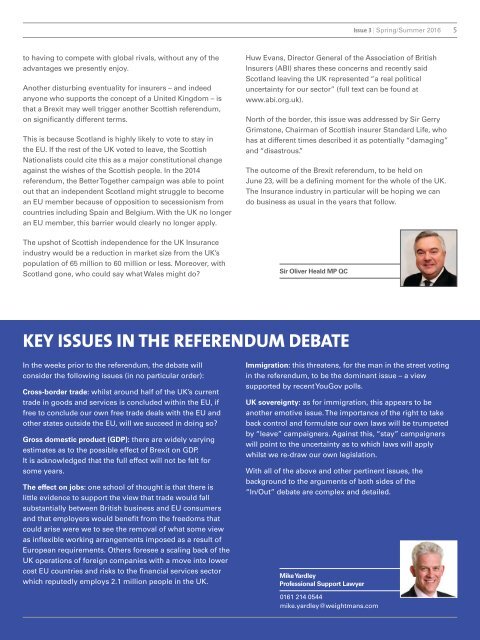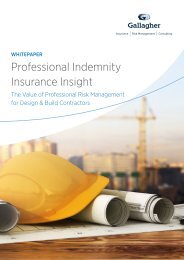InView Spring/Summer 2016
You also want an ePaper? Increase the reach of your titles
YUMPU automatically turns print PDFs into web optimized ePapers that Google loves.
Issue 3 | <strong>Spring</strong>/<strong>Summer</strong> <strong>2016</strong><br />
5<br />
to having to compete with global rivals, without any of the<br />
advantages we presently enjoy.<br />
Another disturbing eventuality for insurers – and indeed<br />
anyone who supports the concept of a United Kingdom – is<br />
that a Brexit may well trigger another Scottish referendum,<br />
on significantly different terms.<br />
This is because Scotland is highly likely to vote to stay in<br />
the EU. If the rest of the UK voted to leave, the Scottish<br />
Nationalists could cite this as a major constitutional change<br />
against the wishes of the Scottish people. In the 2014<br />
referendum, the Better Together campaign was able to point<br />
out that an independent Scotland might struggle to become<br />
an EU member because of opposition to secessionism from<br />
countries including Spain and Belgium. With the UK no longer<br />
an EU member, this barrier would clearly no longer apply.<br />
The upshot of Scottish independence for the UK Insurance<br />
industry would be a reduction in market size from the UK’s<br />
population of 65 million to 60 million or less. Moreover, with<br />
Scotland gone, who could say what Wales might do?<br />
Huw Evans, Director General of the Association of British<br />
Insurers (ABI) shares these concerns and recently said<br />
Scotland leaving the UK represented “a real political<br />
uncertainty for our sector” (full text can be found at<br />
www.abi.org.uk).<br />
North of the border, this issue was addressed by Sir Gerry<br />
Grimstone, Chairman of Scottish insurer Standard Life, who<br />
has at different times described it as potentially “damaging”<br />
and “disastrous.”<br />
The outcome of the Brexit referendum, to be held on<br />
June 23, will be a defining moment for the whole of the UK.<br />
The Insurance industry in particular will be hoping we can<br />
do business as usual in the years that follow.<br />
Sir Oliver Heald MP QC<br />
KEY ISSUES IN THE REFERENDUM DEBATE<br />
In the weeks prior to the referendum, the debate will<br />
consider the following issues (in no particular order):<br />
Cross-border trade: whilst around half of the UK’s current<br />
trade in goods and services is concluded within the EU, if<br />
free to conclude our own free trade deals with the EU and<br />
other states outside the EU, will we succeed in doing so?<br />
Gross domestic product (GDP): there are widely varying<br />
estimates as to the possible effect of Brexit on GDP.<br />
It is acknowledged that the full effect will not be felt for<br />
some years.<br />
The effect on jobs: one school of thought is that there is<br />
little evidence to support the view that trade would fall<br />
substantially between British business and EU consumers<br />
and that employers would benefit from the freedoms that<br />
could arise were we to see the removal of what some view<br />
as inflexible working arrangements imposed as a result of<br />
European requirements. Others foresee a scaling back of the<br />
UK operations of foreign companies with a move into lower<br />
cost EU countries and risks to the financial services sector<br />
which reputedly employs 2.1 million people in the UK.<br />
Immigration: this threatens, for the man in the street voting<br />
in the referendum, to be the dominant issue – a view<br />
supported by recent YouGov polls.<br />
UK sovereignty: as for immigration, this appears to be<br />
another emotive issue. The importance of the right to take<br />
back control and formulate our own laws will be trumpeted<br />
by “leave” campaigners. Against this, “stay” campaigners<br />
will point to the uncertainty as to which laws will apply<br />
whilst we re-draw our own legislation.<br />
With all of the above and other pertinent issues, the<br />
background to the arguments of both sides of the<br />
“In/Out” debate are complex and detailed.<br />
Mike Yardley<br />
Professional Support Lawyer<br />
0161 214 0544<br />
mike.yardley@weightmans.com




